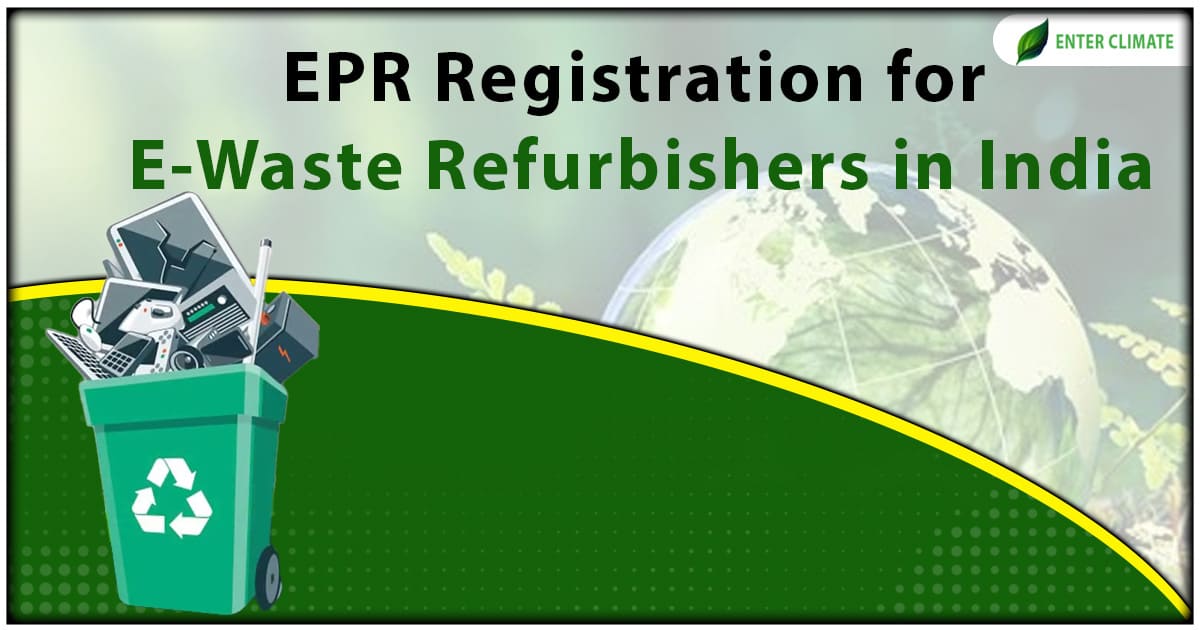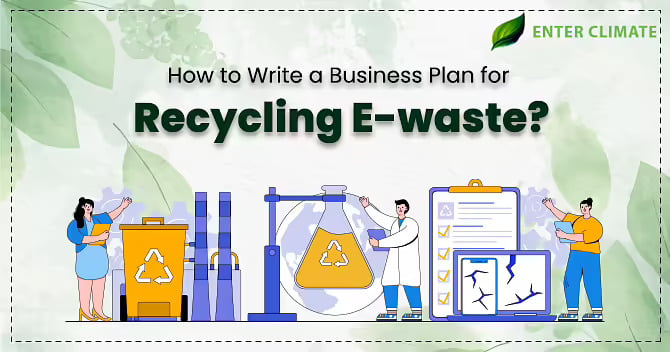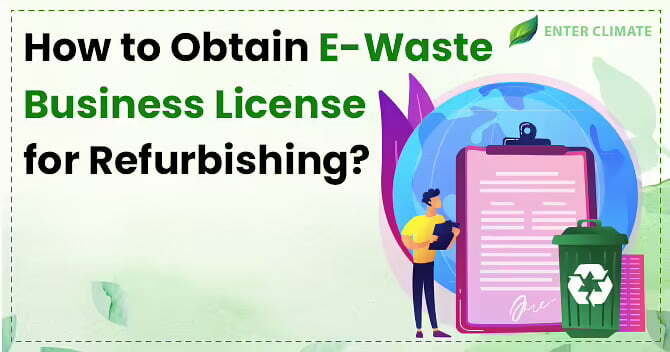EPR Registration for E-Waste Refurbishers in India
 25 Jul, 2023
25 Jul, 2023 
As per industrial data, India is the third-largest generator of e-waste globally, producing over 3.23 million metric tonnes per year. With the growing e-waste, the are many novel approaches being encouraged in the waste management sector. Today the government is focused on promoting sustainable business models by encouraging a circular economy in e-waste management[1]. Refurbished Electronic and Electrical Equipment have significantly influenced this paradigm shift. Today a huge market for quality refurbished products has been created in the country in many segments, thanks to the e-commerce platforms propelling the trend. India has been reportedly leading the global refurbished smartphone market with 19 per cent growth(year-on-year), which was reported in 2022. This article will shed light on the refurbishment process, the EPR registration for e-waste Refurbishers and other applicable legalities.
In EPR registration for e-waste, the Refurbishment processis defined by the E-Waste Management Rules of 2016, which refers to the process of improving the quality and extending the lifespan of used/non-functional Electrical and Electronic Equipment (EEE). A refurbisher is someone engaged in refurbishing used, defective, or non-functional electronic products discarded by OEM.
Regulations governing the EPR registration for e-waste Refurbishers
Rule on Registration: The E-Waste (Management) Rules 2022, issued by the MoEFCC (Ministry of Environment, Forests, and Climate Change) on November 2, 2022, requires manufacturers, producers, refurbishers, and recyclers to register on the designated EPR portal. EPR registration for e-waste is granted to refurbishers for handling, collection, storage, transportation, dismantling and refurbishment of e-waste. Similar provisions also apply to manufacturers, producers, consumers, bulk customers, collection centres, dealers, e-retailers and dismantlers.
Rules on E-Waste Management: Refurbishers have been made responsible for collecting e-waste generated during the refurbishing of electrical and electronic equipment and ensuring its recycling or proper disposal. Refurbishers, therefore, must register on the portal. If the entity falls into multiple categories, then it must apply for EPR registration for e-waste separately for each category. Operating a business without registration is considered illegal.
Rules on engaging with other Stakeholders: Producers can defer their extended producer responsibility (EPR) by purchasing certificates from refurbishers for a period specified by the CPCB based on the quantity of e-waste involved. This deferred responsibility will be added to the producer’s EPR obligations once the extended lifespan of the refurbished product expires. However, the EPR obligation will only cease after the end-of-life disposal is carried out by a registered recycler with an EPR certificate rather than a refurbished certificate.
Rules on EPR Compliance: Entities covered by these rules for EPR registration for e-waste must file annual and quarterly returns in the prescribed format as per the rules. The returns must be submitted by the end of the month following the relevant quarter or year. The Central Pollution Control Board (CPCB) may charge registration fees and annual maintenance fees based on the capacity of e-waste generated, recycled, or handled by the entities.
Eligibility for acquiring EPR registration for e-waste
Refurbishment, as widely acknowledged, has been proven to offer greater benefits than the recycling process of electronic waste (e-waste) since it reduces e-waste and significantly enhances the product and extends the lifespan of Electrical and Electronic Equipment (EEE). For a refurbishment business, the entrepreneur needs to consider specific criteria:
- The EPR regime mandates the collection of e-waste generated during the refurbishing process and transferring it to the recycler, and regular uploading of relevant details on the CPCB portal.
- The entrepreneur must also ensure that refurbished equipment complies with the Compulsory Registration Scheme of MEIT and the standards set by BIS.
- The refurbisher must ensure sufficient space and land to accumulate all the e-waste.
- The refurbisher needs to have a designated closed area within the establishment.
- The refurbisher should possess the necessary operational machinery required for the refurbishment process.
- Lastly, the business necessitates a skilled and knowledgeable workforce with ample experience.
Legalitiesinvolved in the EPR registration for e-waste
Refurbisher has to obtain CTE and CTO under the Air Act, 1981 and the Water Act, 1974, from the concerned SPCB/PCC.
Refurbishers must obtain a certificate of registration and proof of installed capacity from the District Industries Centre (DIC) or any other authorised government agency.
A refurbisher will also need to obtain one-time Refurbishment authorisation from the concerned SPCB/PCC. If the e-waste refurbisher generates hazardous waste, it will need an HWM Authorisation for its management or agreement with a TSDF If the facility employs treatment, storage, and disposal assistance through a registered TSDF.
Refurbishers must complete the EPR registration for e-waste at the CPCB portal.The application and a detailed EPR Action Plan must be submitted to the CPCB.The following are the documents required at the time of EPR authorisation –
- Identity proof
- Details of the signatory
- Contact details
- Address proof
- BIS license
- Details of compliance with RoHS (Restriction of Hazardous Substances Directive)
- Certificate of incorporation of the manufacturer/importer
- EPR Action plan
- Estimation of e-waste/plastic waste
- Product details
- Copy of agreement entered with storage/ disposal dealers, recyclers, collection centres etc.
- Details of toll-free number and website
- Any other document as may be required
Responsibility of a Refurbisher
As refurbishment is part of the waste management process, the refurbisher must assume certain responsibilities based on the Extended Producers’ Responsibility. These responsibilities include:
- During refurbishment, the refurbisher must collect old/ non-functional orE-waste and transfer them to an approved dismantler or recycler.
- Refurbishers are obligated to ensure that their refurbishment operations do not harm the environment by appropriately storing and transporting E-waste.
- Refurbishers are required to file an annual return before June 30 with the relevant State Pollution Control Board, providing details related to the preceding year.
- The refurbisher is responsible for managing their business in a manner that does not pose risks to public health or the environment.
- Additionally, the refurbisher must maintain a record of the E-Waste handled in Form-2 and make it available for scrutiny by the appropriate authorities.
- The refurbisher must also track how E-waste is managed and allow the relevant authority to examine the associated documents.
- When refurbishing used electrical and electronic equipment, non-functional components must be either removed or repaired. These non-functional electronic components are considered E-Waste. Furthermore, some equipment may be too expensive to refurbish and is therefore classified as E-Waste.
Consequently, it is the refurbishers’ responsibility to dispose of the E-Waste by the E-Waste Management Rules.
Conclusion
Between the financial years 2018 and 2020, e-waste generation in India increased by 43%. In the fiscal year 2019-2020, India generated 1,014,961 tonnes of e-waste, a 32% increase compared to the previous year. These numbers denote an immediate need for managing this waste. By encouraging refurbished products in the market, India will fuel progress in the circular economy and tackle e-waste-related environmental challenges. However, the collection infrastructure for e-waste in the country remains confined to cities, with only 3.6% and 10% being collected in 2018 and 2019, respectively. Therefore, a robust collection framework is required for the refurbishment ecosystem to thrive in the country. A refurbisher will also need a network of such collectors and used EEE importers to build a strong presence in the electronics industry. The assistance of industry experts involved in the licencing and compliance management for e-waste businesses can help create such channels.
FAQs
The Central Pollution Control Board (CPCB), operating under the Ministry of Environment, Forest and Climate Change (MoEFCC) of the Government of India, grants the EPR Authorization.
The responsibility of managing e-waste after the end of its lifecycle is assigned to the manufacturer/importer of electronic and electrical products through EPR Authorization granted by the CPCB under the MoEFCC of the Government of India.
EPR authorisation refers to the obligation placed on Indian manufacturers/importers of EEE products for effective management of e-waste generated from the end-of-life disposal of that product.
EPR Registration is a requirement that ensures the proper handling and management of plastic packaging waste through recycling, reuse, or appropriate end-of-life disposal methods.
Extended Producer Responsibility (EPR) in the context of E-Waste refers to the responsibility placed on producers of electrical or electronic equipment to manage and facilitate the proper disposal and recycling of E-Waste generated from the products that they introduced in the market in an environmentally sound manner.
Refurbished products are often comparable in quality to brand-new products. They frequently come with a limited warranty or guarantee and are available at a lower cost than new items.
The E-waste Rules 2022, effective from April 1, 2023, impose certain restrictions on the utilisation of harmful substances during the production of electrical and electronic equipment due to their detrimental effects on human health and the environment.
The regulations for managing e-waste require businesses to establish provisions for properly disposing of discarded electronic items. The MoEFCC oversees these rules.
Read our Article: What Are Compliance Requirements For E-Waste Refurbishment Business?
Categories
Latest Post
Air pollution Dispersion Modeling
Natural Disaster Risk Assessment
Endangered Species Protection
Aquifer Recharge Project
Sustainable Sanitation Solutions














